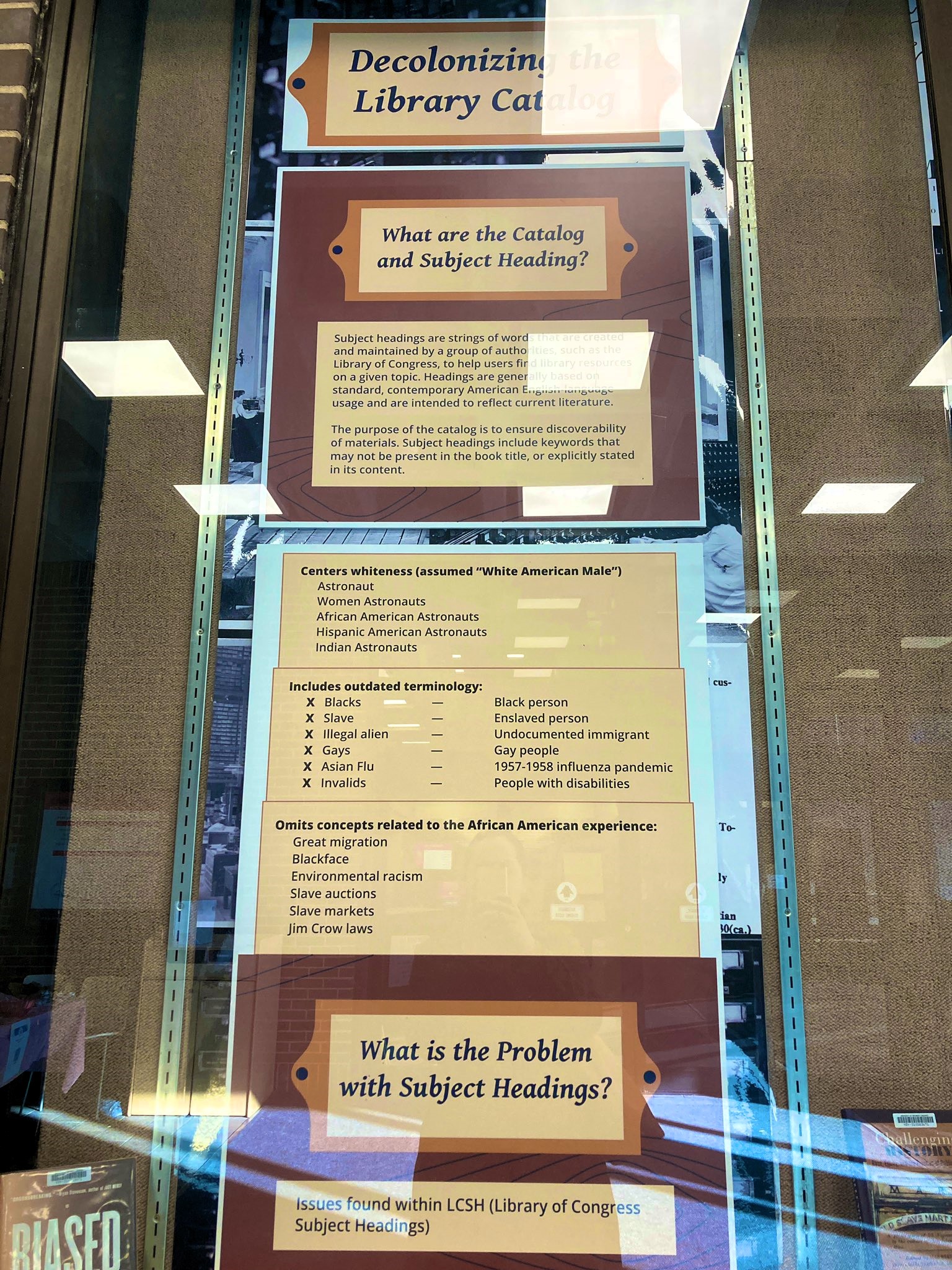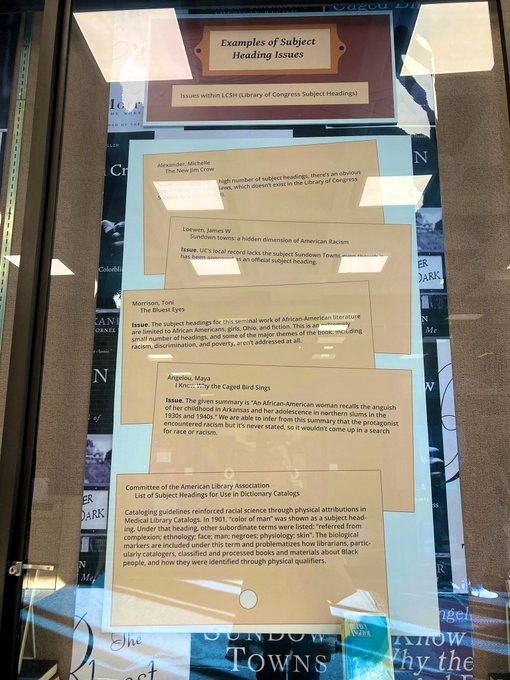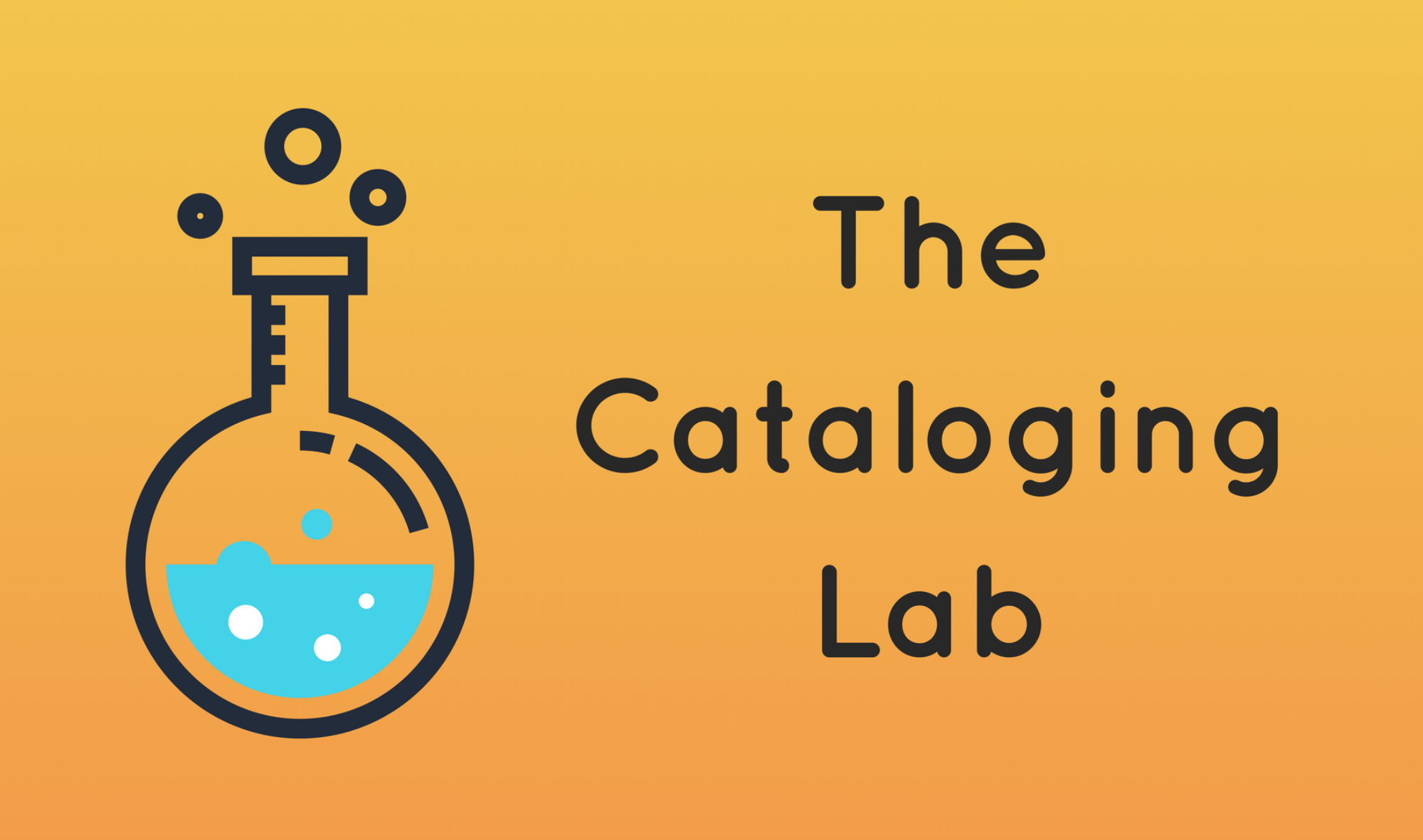Critcatenate is an effort to keep folks up to date on critcat efforts with a monthly-ish roundup of news. Critcat is short for critical cataloging, focusing on the ethical implications of library metadata, cataloging, and classification practice, standards, and infrastructure.
#critcat in February 2024:
- New survey: Survey on Cataloging Ethics from Karen Snow and Elizabeth Shoemaker. They write: Please help us with our study of cataloging ethics! If your official job duties include cataloging and you would like to share your thoughts on what you think are important ethical issues catalogers face, please complete our questionnaire, even if you completed our initial questionnaire in 2019. It should only take 10-15 minutes, depending on the depth of your answers. No identifying information will be collected. Deadline: March 8, 2024.
- New call for participation: consider joining the Cultural Assessment Working Group, a part of the DLF AIG (Digital Library Federation Assessment Interest Group). The Cultural Assessment Working Group is designed to raise awareness of cultural bias and strive for diversity, equity and inclusivity in digital collection practice. The group aims to publish their Inclusive Metadata Toolkit in 2024. They’re especially looking for participants who can contribute to the toolkit sections about advocacy, assessment, and implementation case studies. Learn more at the Cultural Assessment Working Group wiki page and consider joining the Cultural Assessment Working Group discussion list/Google Group for announcements and to share your interest.
- New statement and call to action: The Inclusive Terminology Glossary’s Inclusion of Palestine: A Statement by Carissa Chew. Last month I shared how the Collections Trust in the UK dropped a link to the Inclusive Terminology Glossary because of political pushback. If you haven’t yet, please consider emailing the Collections Trust to request that their rash decision to remove the link to this valuable resource be reversed; here’s an example of what you might write.
- more about this situation: Museums Charity Criticised for ‘Disappointing’ Decision to Remove Links to Inclusive Language Guidance, by Emily Harle, published by UK nonprofit-focused news site Third Sector
- New call for papers: Knowledge Organization (KO) Special Issue: Critical and Social Knowledge Organization. “We invite authors to submit an abstract for consideration for this special issue. Potential topics: knowledge organization support for social justice; truth and relevance in knowledge organization; inclusive terminology; Antiracism, anticolonialism and feminist stances; Indigenous knowledge organization; ethics in knowledge organization; epistemicide and epistemic (in)justice in knowledge organization systems. Please send a 500-700 word abstract with author name(s), affiliation, email address and name of the corresponding author to: suellenmilani@id.uff.br, widad.mustafa@univ-lille.fr and nataliatognoli@id.uff.br. Deadline for abstracts: April 1.
- New call for participants: the new Occult SACO and NACO funnels are now forming to address subjects relating to the occult, spiritualism, new religious movements, and contemporary paganism. Contact occultfunnels@gmail.com to participate in this work.
- New article: Cultus, Cult, and Cults: Suggestions for Revising Problematic Library of Congress Subject Headings by Jamie Carlstone and Ermine L. Algaier IV, published in TCB: Technical Services in Religion & Theology
- New article: Prejudice But No Pride: The Portuguese Universal Decimal Classification’s Labelling of Sexual Orientation by Paulo Vicente, Ana Lúcia Terra, and Maria Manuela Tavares de Matos Cardoso, published in the January 2024 issue of IFLA Journal
- New article: Implementing the DDC Optional Arrangement for Religion at a Public Library: A Case Study by Lisa Thornton, published in Cataloging & Classification Quarterly
- New article: Inclusive Description in the Glasgow School of Art Library’s Published Catalog by Carissa Chew, published in Collections: A Journal for Museum and Archives Professionals
- New article: Forming and Sustaining a Community of Practice for Volunteer-Based EDI Work by Ramona Caponegro, Suzan Alteri, Krista Aronson, Lisely Laboy and Andrea Jamison, published in In the Library with the Lead Pipe. Discusses the Diverse BookFinder, a resource which provides consistent metadata for children’s picture books featuring Black and Indigenous people and People of Color (BIPOC), showing how BIPOC characters are described and what message the books send.
- New paper: Arbiters of Ugliness: A Review of Strategies for Describing Offensive Archival Materials by Leah Minadeo, a student at Wayne State University
- Recently updated: Guidelines for Inclusive and Conscientious Description; written by Charlotte Lellman with input and collaborative support from Hanna Clutterbuck-Cook, Amber LaFountain, and Jessica Sedgwick; published by Harvard’s Center for the History of Medicine. Focused on describing medical resources and including a decision tree when encountering harmful or outdated terminology.
- New book now available for preorder: Inclusive Cataloging: Histories, Context, and Reparative Approaches, edited by Amber Billey, Elizabeth Nelson, Rebecca Uhl
- New book now available for order: Ethics in Linked Data, edited by Alexandra Provo, Kathleen Burlingame, and B.M. Watson, published by Library Juice Press
- New resource: PCC FAQ: Cataloging of Resources Generated Using Artificial Intelligence (AI) Software. Developed by the Program for Cooperative Cataloging (PCC) Committee on Standards advising catalogers how to treat works co-created by generative AI programs. The upshot: “Consider a named AI or generative computer program used to create a resource to be a related work, not as an agent, even when the resource being cataloged presents an AI or other computer program as a creator or contributor.”
- New webinar recording: Unseen Labor Panel Discussion (video recording, slides) about the Fresno State cross-stitching and embroidery exhibition as a creative expression of cataloging and metadata, featuring Ann Kardos (University of Massachusetts-Amherst), Bobby Bothmann (Mankato State), Tina Marie Maes (Madison Public Library), and Julie Moore (Fresno State).
- New webinar recording: February 2024 OCLC cataloging community meeting, including a DEI panel discussion featuring these topics:
- Harmful Language in Transcribed Titles: A Case Study by Treshani Perera (University of Kentucky Libraries)
- Prejudicial Materials Working Group of RBMS’s Controlled Vocabularies Editorial Group by Sarah Hoover (University of North Carolina at Chapel Hill)
- New exhibit: Decolonizing the Library Catalog at the University of Cincinnati; curated by Susan Banoun, Mikaila Corday, and Olga Hart; designed by Francesca Voyten. The exhibit includes a one-page bibliography and will be on display through the end of March. Thank you to Nimisha Bhat for the photos and alt text!


![Efforts to Decolonize the Catalog 1930s - Dorothy Porter, Catherine Latimer, and Francis Lydia Yocom developed local “unauthorized” subject headings for their respective institutions due to lack of inclusivity from LCSH. 1970s - Sanford (Sandy) Berman began the contemporary movement to modernize LCSH. He created an independent subject headings system at the Hennepin County Library in Minnesota improving upon LCSH with a responsive approach. His work moved to not only reform LCSH but also assert libraries' autonomy to move beyond its limitations. 1980s - Some problematic subject headings were eliminated or changed, including “Yellow peril". 1999 - The African American Subject Funnel Project was initially conceived as part of SACO (Subject Authority Cooperative Program) and works to create and update subject headings related to African American culture and history. The Funnel promotes the aims of the African American Studies Librarians Interest Group (AASLIG) which are to support research and services associated with identifying, preserving and spreading information on the study of African American life. They work with the Library of Congress Program for Cooperative Cataloging (PCC) to provide input and guidance on terminology that accurately reflects the African American experience. 2020s - Long-criticized subject headings changed (removed "riots" to make “Tulsa Race Massacre"), glossaries and thesauri of inclusive language created and libraries started publishing statements on potentially harmful language. Terms such as Black Wall Streets and sundown towns are not new to those familiar with African-America, history and culture. These terms, however, did not exist in LCSH until funnel project members worked to develop these headings with help from insider perspectives and scholarly references. While we strive to acquire and make findable materials that are representative of our diverse community and the world. We recognize that materials with harmful, offensive and non-inclusive content may be included in our Library Catalog. If you encounter any harmful, offensive, or non-inclusive language in the library catalog, we welcome your feedback at [unreadable email address]](https://cataloginglab.org/wp-content/uploads/2024/02/UCincinnati-efforts-to-decolonize-library-catalog.jpg)
But wait there’s more! In which your Critcatenate editor catches up on the literature.
- New-ish article: The Canon No Longer Applies: How the Fine Arts (N) Range of the Library of Congress Classification System Perpetuates Bias by Privileging Fine Art Over Craft by Stefanie Hilles, published in the October 2023 issue of Art Libraries Journal
- New-ish article: Unsettling the Library Catalog: A Case Study in Reducing the Presence of “Indians of North America” and Similar Subject Headings by
Karl Pettitt and Erin Elzi, published in the April 2023 issue of Library Resources & Technical Services - New-ish article: Mrs. His Name: Reparative Description as a Tool for Cultural Sensitivity and Discoverability by Elspeth A. Olson, published in the Journal of Western Archives
- New-ish article: Diversity, equity and inclusion principles for custom taxonomies by Sharon Mizota, published in the Journal of Digital Media Management
- New-ish podcast episode: Indigenous Systems of Knowledge with Dr. Sandy Littletree on the podcast Overdue: Weeding Out Oppression in Libraries
- New-ish blog post: Zhuo Pan, Resident Librarian for Resource Description, describing the work done at Duke University Libraries to address Chinese-language cataloging backlogs
- New-ish blog post: It’s All in the Details: Implementing Inclusive Metadata by Harriet Wintermute, describing the work that’s been done at Iowa State University relating to Iowa-related Indigenous communities, including creating a list of preferred terms and a list of services and resources available to Indigenous peoples to offer in gratitude for sharing information about preferred names
- New-ish blog post: Exploring the Iowa Women’s Archives Disability Collections by Abbie Steuhm, describing reparative description work on disability-related resources
- New-ish blog post: What’s New to “SNAC” On by Dina Herbert, describing work relating to revising descriptions in archives by the SNAC Enslaved Description Group and the SNAC Indigenous Description Group [SNAC = Social Networks and Archival Context]
- New-ish blog post: Separating Fact from Fiction: Maximizing Dealer Descriptions in Finding Aids by Mae Casey, describing work at Penn State to describe archival work relating to reproductive rights
- New-ish thesis: Suggested Revisions of Library of Congress Subject Headings for Indigenous Peoples in the Sequoyah National Research Center Online Library Catalog by Mikaela Bailey; master’s degree from the University of Arkansas at Little Rock
- New-ish thesis: Historical Subject Representation: An Analysis of Historical Vocabularies for Temporally-Aligned and Contextual Access Points by Sam Grabus; doctoral thesis from Drexel University
- New-ish thesis: Veuve, Viuda, Viduam and other Representations of Women’s Bibliographic Labor Recovered in Wilson Library’s Rare Book Collection by Kelly Bullard; master’s thesis at the University of North Carolina
- New-ish presentation recording: Embedding Equality, Equity, Diversity and Inclusive Practice in UK Archive Sector by Kirsty Fife, hosted by the Archives and Records Association (UK & Ireland). Part 3, Collections management and development, includes discussion of cataloging best practices
- Missed these presentation slides from last year: At Lightning Speed? The Recent Surge of Long-Needed Changes to LCSH by Tina Gross
- Missed this article from last year: Terminology Preferences of the LGBTQ+ Community: A User Study by Heather Moulaison-Sandy, Ngoc-Minh Pham, Karen Snow & Brian Dobreski, published in the proceedings of iConference 2023: Information for a Better World: Normality, Virtuality, Physicality, Inclusivity
- Missed this article from last year: Hidden Voices: A Case Study Analysis of Subject Headings for Book Titles on Women in Science by Heidi Blackburn and Jason Heppler, published in Science & Technology Libraries
- Missed this conference poster the first time around: Analyzing and Enhancing CMC Biography Subject Headings for Race and Gender by Sai Deng, Peter Spyers-Duran, Jeanne Piascik, Amy Dovydaitis, Kristine Shrauger, discussing the headings applied to juvenile biographies in the Curriculum Materials Center at the University of Central Florida
- Missed these conference slides last year: Improving Representation and Access Through Ethical Description by Kristi Bergland, Allison McClanahan, and Treshani Perera; slides from the 2023 Music Library Association conference
- Missed this back in 2022: Finding the Words: Addressing language in archive collections as archivists, heritage professionals and volunteers, 20-page booklet written by Lisa Kennedy
I’m doing a brief review of the new LCSH lists for headings that might be of interest to readers of Critcatenate. LCSH list numbers consist of a two-digit number for the year and a two-digit number for the month the headings were approved (for example, headings on list 2310 were approved in October 2023).
New LC headings of note on list 2310:
- New LCSH: Adoptees–Identity
- New LCSH: Transmisogyny
The 2310 Summary of Decisions includes rejections of proposals such as Authors, White; Ethnoculture; and Evil, Resistance to.
Upcoming:
- Monday March 4 through Friday March 8: ALA Core Interest Group Week. Not much critcat-related this year, but this session caught my eye:
- Friday March 8: Creative Ideas in Technical Services, including a presentation on “Homosaurus Usage in the OCLC Database: an Exploratory Analysis” by Paromita Biswas, Amanda Mack, and Erica Zhang
- Thursday March 14-Saturday March 16: New England Archivists Spring 2024 Meeting includes sessions:
- Balancing Acts: Case Studies of Reparative Description and Harmful Content Warnings
- “Problematic Content Exists in Our Collections”: Harmful Content Statements
- Friday April 5: 2024 New England Technical Services Librarians (NETSL) Spring Conference has a theme of “If It’s Broke, Let’s Fix It: Open Dialogue Between Problem and Opportunity.” Your Critcatenate editor will be presenting on the Cataloging Lab.
- Thursday April 18: Inclusive Cataloging webinar from Tim Keller at Oberlin College, hosted by OhioNet
- new course beginning April 21: Inclusive Description for Cultural Heritage Materials, presented by Treshani Perera and hosted by We Here
Please let me know if there’s anything else coming up!
